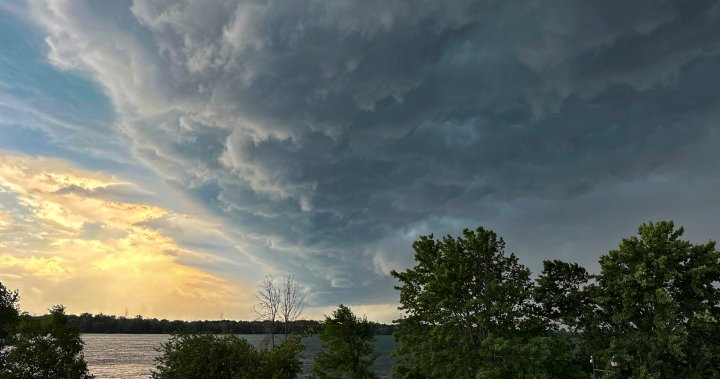Summarize this content to 2000 words in 6 paragraphs
A tornado that ripped through the Greater Montreal Area Wednesday night uprooted trees, overturned a semi-trailer and caused damage to infrastructure, Environment Canada says.
The federal weather agency confirmed Thursday morning that a tornado touched down in Brossard, Que., at 8:12 p.m.The Northern Tornado Project (NTP), which is based in Ontario, will conduct an investigation Thursday to assess the damages, Environment Canada said in its weather summary Thursday.Pictures shared by the weather agency on X showed the damage the tornado caused.A tornado touched down in Brossard at around 8:12pm last night. The tornado uprooted trees, overturned a semi-trailer and caused damage to infrastructure. #QCstorm📷: Geneviève Tougas (@TougasGenevieve) pic.twitter.com/iyg0l6dGD0— ECCC Weather Quebec (@ECCCWeatherQC) July 25, 2024 The NTP, out of Western University in London, Ont., published a summary of new data in May stating that Saskatchewan is no longer the province with the highest tornado frequency. The Prairie province had an average of 17.4 tornadoes per year in the 1980-2009 dataset, dropping to 14.6 per year in the 1991-2020 data.
Dave Sills, executive director of the NTP, told Global News in June that since the group started in 2017, they’ve found that the strongest tornadoes have been around Barrie, Ont., eastern Ontario and southern Quebec.Historically, some of the biggest tornadoes in Ontario were recorded in May and June, including EF4 tornadoes in Sarnia in May 1953 and Barrie in May 1985 and an EF4 in the Windsor area in June 1946.
In the past 20 years, however, severe tornado activity has shifted later in the summer – July through September. “There was an EF3 tornado that went through Dunrobin (Ottawa) and into Gatineau. That was September 21st, 2018.”An EF3 tornado that struck Goderich in 2011 occurred in late August.Why the season is extending into September is still unknown, but Sills theorizes the Great Lakes may be playing a role.“If they have warmed — which is what I understand from the climate change studies and the modelling studies is that the Great Lakes have been warming — that can have an impact,” he suggested.“When we looked at our neighbouring states, Michigan and New York state, they didn’t have that same pattern where things were shifting later. It was something peculiar to southern Ontario.”— with files from Jacquelyn LeBel
© 2024 Global News, a division of Corus Entertainment Inc.


